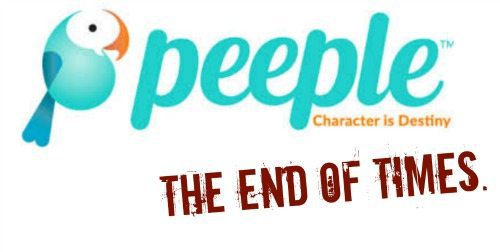I’m seriously thinking about crawling out from underneath my bed today. I took shelter there last year along with my wife, children and our pets. We’ve been living off dust bunnies and drinking condensation from the water pipes ever since the pizza guy stopped delivering to our bedroom on account that we were “pathetic” and “in need of mental health services.”
We hid under the bed because society appeared on the brink of collapse and we were all in for a “Walking Dead”-style post-apocalyptic throwdown. The signs were all there: Continuing turmoil in Europe and the Middle East abroad, and, at home, the spectre of a successful Trump candidacy.
But for me, the true sign of the End Times was the emergence of an app called Peeple.

Peeple is the “Yelp for People,” as described by company founders Nicole McCullough, Julia Cordray, and Pazuzu.
As of this writing, Peeple has yet to be released. It’s website just features a spot where you can join its “waiting list” along with the somewhat ominous, Orwellian slogan, “Character is Destiny.”
There’s also the message, “Join the positive revolution #Oct12.”
Oct. 12 has come and gone and so I’m allowing us to emerge from under the bed just long enough to grab some microwavable burritos and the flintlock off the mantle before barricading us in the bathroom (It’s going to be sooooo nice to have access to running water again!)
There’s a lot of reasons why we ought to shun Peeple, not the least of which is the spelling of “Peeple.”’
At best, “Peeple” sounds more like a Fisher-Price line of preschool toys, as opposed to being a harbinger of the end of Western civilization. At worst, “Peeple” also sounds like one of the faux-companies featured in Mike Judge’s brilliant series “Silicon Valley.”

But it’s the concept behind Peeple that’s earned it a big, fat public backlash
The Washington Post described Peeple in this way:
When the app does launch, probably in late November, you will be able to assign reviews and one- to five-star ratings to everyone you know: your exes, your co-workers, the old guy who lives next door. You can’t opt out — once someone puts your name in the Peeple system, it’s there unless you violate the site’s terms of service. And you can’t delete bad or biased reviews — that would defeat the whole purpose.
Imagine every interaction you’ve ever had suddenly open to the scrutiny of the Internet public.
In the wake of a very loud public outcry, Cordray revamped in anticipation of its November launch to be 100 percent opt-in, and announced that “ users will need to approve all reviews, meaning that there will no longer be a way to leave abusive, critical or otherwise negative comments,” according to the Post.
The Boston Globe, however, reported that the CEO remained defiant as to Peeple’s original intentions:
“We are bold innovators and sending big waves into motion,” reads a steely “CEO Update” posted to the app’s website, “and we will not apologize for that because we love you enough to give you this gift.”
Just let that sink in.
To be fair, Peeple is hardly the first person-rater on the internet. Ratemyprofessor.com, Hot or Not, and Tinder come to mind. This article in Observer also lists a couple of apps that are somehow even worse than Peeple.
I think, though, that as long as there’s been social media, there’s been a method to judge friends, family and colleagues. I’m thinking about MySpace and the infamous Top 8, where you could name your Top 8 friends. You may remember the grade school-level ire which resulted from that concept.
I’ll examine the fate of Myspace in an upcoming post.
Looking to the future, it seems there’s plenty of social media platforms far more egregious than Myspace’s Top 8 that, in retrospect, appears downright quaint.
I’m not suggesting we throw the baby out with the bathwater. The ability for everyday people to assign ratings can, in fact be a force for powerful change. Yelp!, for instance, can be a fantastic tool for businesses looking to improve customer service.
But those kinds of ratings belong to politicians, companies, corporations, and other public entities. Applying that to your friends and neighbors is enough to shake your faith in humanity and make you want hide under your bed.
So the question is, once Peeple is available, will you download it? Or are you cleaning out under your bed as well?
